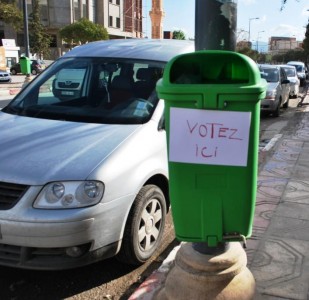On May 10, Algeria's first legislative elections since the start of the Arab uprisings were held. The National Liberation Front (FLN) and sister party the National Democratic Rally won a majority of seats, defeating an Islamist alliance.
The ruling FLN has dominated Algeria's political life since independence. These elections were seen as a test of the its legitimacy, and the official turnout figure of 42.9%, an improvement on the 35% turnout for the 2007 elections, was claimed by some as an endorsement for recent political reforms. However, despite the fact there have not been the kind of anti-regime protests in Algeria as elsewhere in the Arab world, there is widespread dissatisfaction with the government. Many people expressed their political dissent through boycotting the elections.
On election day Algerians tweeted under the hashtag #10MaiToz, “toz” meaning nonsense.
Yasmine Bouchène wrote:
@Yaspuppchen: Si dans d’autres pays, voter est un acte citoyen. En Algérie, ne pas le faire l’est apparemment d’avantage ! #10maiToz
There were widespread accusations of fraud and a “manipulation of the results”.
Yanis Chalouche joked:
@Mister16Five: Les actes de citoyenneté sont tellement ancrés dans notre culture et notre éducation, que même les morts ressuscitent pour voter. #10MaiToz
Blogger Baki 7our tweeted:
@7our: Proverbe algérien: “c'est quand le bureau de vote est vide que l'urne se remplit”. #10MaiToz #Fraude
Journalist Borzou Daragahi noted the lack of voters:
@Borzou: Algeria: At election center in Larbatache outside Algiers city, very, very few voters; mostly elderly. Where are youth?
A citizen-driven election monitoring website was set up to report fraud. More than 150 infractions were recorded across Algeria.
In the above video [ar], a 23-year-old man called Tarek explains that the Algerian people have had enough of politicians who have failed since 1999 (when Abdelaziz Bouteflika became president) to make life better for Algerians. One of the strongest moments of the clip is when Tarek says that he'd rather be “eaten by fish than eaten by worms (poverty)”.









